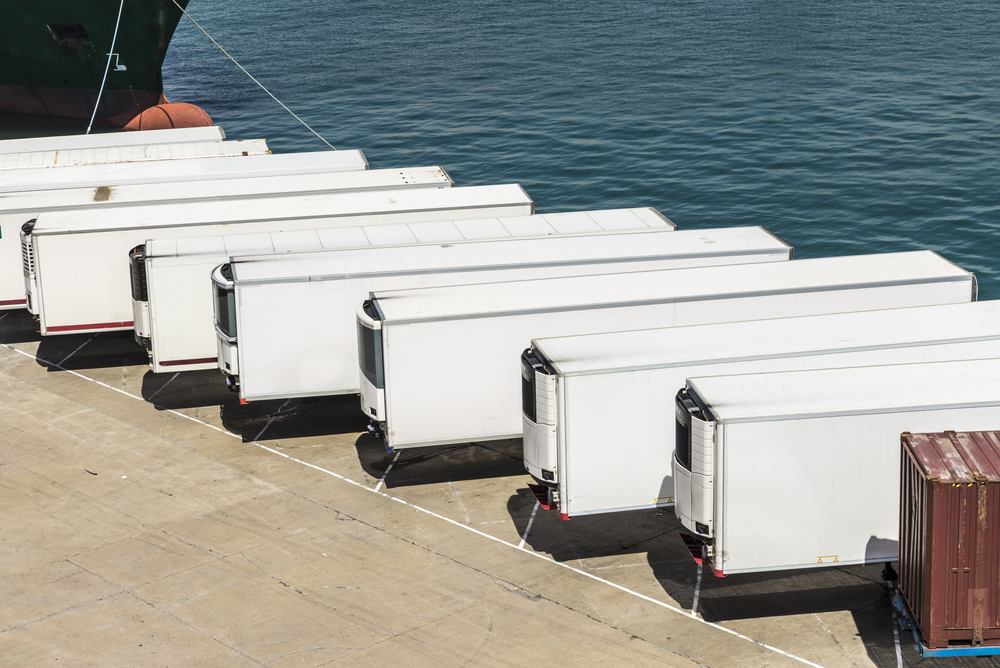Reefer trailers, an indispensable component of the modern logistics and supply chain world, stand as the ultimate solution for transporting temperature-sensitive goods. Short for “refrigerated trailer,” a reefer is a specialized freight vehicle designed to maintain cargo at specific temperatures and humidity levels during transport. This capability is not just an added luxury; it’s a critical requirement for a vast array of products, including fresh produce, frozen foods, pharmaceuticals, and even sensitive electronics. By providing precise temperature control, reefers play a pivotal role in the refrigerated freight sector, ensuring that perishable goods arrive at their destination in the same condition as when they embarked on their journey, thus maintaining quality and safety standards.
The importance of reefer trailers extends beyond simple transportation; they are key to preserving the integrity and value of temperature-sensitive cargo throughout the logistical process. The ability to control the internal environment of these trailers means that products that would otherwise spoil or become damaged in standard shipping conditions can reach markets in pristine condition. This capability is essential not just for the preservation of the goods but also for the reputation and reliability of businesses that depend on the safe delivery of their products. In this blog, we will explore the myriad benefits that reefer trailers offer, delve into the logistics of operating these sophisticated vehicles, and discuss how selecting the right logistics partner can transform challenges into opportunities, leading to satisfied customers and business growth. Through this comprehensive overview, readers will gain insights into how leveraging the power of refrigerated shipping can elevate their operational capabilities to new heights.
Understanding Reefer Shipping
Refrigerated trailers, commonly known as reefers, are a technological marvel in the trucking industry, designed to transport goods that require specific temperature conditions. These trailers are equipped with refrigeration units that control the internal temperature and humidity levels, making it possible to haul a wide range of perishable and temperature-sensitive products across vast distances without risking spoilage or damage.
The primary function of reefers is to maintain the integrity of the cargo, ensuring that everything from food items to sensitive electronics arrives at its destination in optimal condition. This capability is not just a convenience but a necessity in today’s global supply chain, enabling the trucking industry to meet the demanding requirements of various sectors by providing a controlled environment on wheels.
The science behind refrigeration and temperature control in reefers is both fascinating and complex. Utilizing principles of thermodynamics, reefers can absorb heat from within the trailer and expel it outside, thereby maintaining the desired temperature range. This is achieved through a cycle of refrigeration that involves the compression, condensation, expansion, and evaporation of a refrigerant.
This meticulous control over the trailer’s internal environment allows for the safe transportation of a wide array of products. Dairy products, for example, must be kept cool to prevent spoilage and ensure safety for consumption. Pharmaceuticals, on the other hand, often require strict temperature controls to maintain their efficacy. Similarly, many other temperature-sensitive items, ranging from fresh flowers to frozen foods, rely on the advanced technology of reefers to reach their destinations without losing their value or viability. This versatility and reliability make refrigerated trailers an indispensable tool in the logistics and transportation industry.

The Backbone of Refrigerated Freight Transportation
Reefer trailers serve as the backbone of refrigerated freight transportation, significantly enhancing the efficiency and reliability of moving perishable goods across vast distances. Their role is crucial not only in ensuring that temperature-sensitive products are maintained in peak condition but also in contributing to the overall effectiveness of supply chain and freight management systems. In the larger context, reefers facilitate seamless logistics operations, allowing for the timely and safe delivery of a wide array of goods, thus preventing spoilage and ensuring that supermarkets, pharmacies, and other retailers can consistently meet consumer demand.
The integration of real-time data and DAT freight analytics into the management of reefer shipments has transformed the industry. These technological advancements provide logistics professionals with invaluable insights into shipment statuses, environmental conditions, and market trends, enabling more informed decision-making.
Logistics and Freight Management Solutions
The integration of refrigerated trailers, or reefers, into logistics and supply chain solutions marks a significant advancement in the transportation of goods that require controlled temperatures. This integration is not just about adding refrigeration capabilities to trucks; it represents a holistic approach to logistics management, where the precise needs of temperature-sensitive cargo are considered at every stage of the supply chain. Logistics partners leverage the capabilities of reefers to tailor transportation solutions that meet the specific requirements of perishable goods, pharmaceuticals, and other sensitive products.
By doing so, they enhance service quality, ensuring that goods are not just delivered on time but also in perfect condition. This meticulous attention to temperature control throughout the transportation process significantly reduces the risk of spoilage and damage, directly impacting the bottom line of businesses that depend on the integrity of their products upon arrival.
The effectiveness of using refrigerated trailers in logistics and supply chain management is highlighted through numerous case studies that demonstrate successful shipments with temperature range precision. For instance, a pharmaceutical company might require the transportation of vaccines at a stable temperature of 2°C to 8°C from the manufacturing site to distribution centers across the country. Logistics partners, utilizing advanced reefers equipped with real-time temperature monitoring and GPS tracking, ensure the vaccines are maintained within this critical range throughout their journey, thereby preserving their efficacy. Similarly, the transportation of fresh produce, such as berries and leafy greens, presents its own set of challenges, requiring not just cool temperatures but also specific humidity levels to maintain freshness.

The Cost of Refrigerated Shipping – Understanding Reefer Rates
Understanding reefer rates is crucial for businesses that rely on the transportation of temperature-sensitive goods, as these rates directly influence the cost of refrigerated freight and, by extension, the overall logistics budget. The pricing for refrigerated shipping is affected by a variety of factors, including fuel costs, the distance of the shipment, seasonal demand, and the specific requirements of the cargo, such as temperature and humidity levels. As companies navigate the complex landscape of competitive rates versus the quality of service, finding the right balance becomes imperative to ensure both budget efficiency and the safety of the goods transported.
This balance is achievable through the strategic use of tools and strategies designed for cost-effective freight management, such as optimizing routes, utilizing backhauling to avoid empty return trips, and leveraging technology for better load planning and temperature monitoring. Additionally, partnerships with reliable logistics providers who offer transparent pricing and high service standards can also contribute to maintaining this equilibrium.
Choosing the Right Logistics Partner for Reefer Shipping
Choosing the right logistics partner for reefer shipping is a decision that hinges on several critical factors, including the partner’s expertise in handling temperature-sensitive shipments, the breadth and reliability of their network, and the quality of their refrigerated equipment. A partner with a deep understanding of the complexities involved in reefer shipping can navigate the myriad regulations that govern the transportation of perishable goods, ensuring compliance and preventing costly delays or fines. Their network’s reliability ensures that shipments can be efficiently routed through optimal paths, while state-of-the-art refrigerated equipment guarantees that goods are maintained at precise temperatures throughout their journey.
A hallmark of a commendable logistics partner is their commitment to open, transparent communication and the provision of real-time updates on shipment status. This level of communication is vital for the smooth execution of reefer shipments, as it enables proactive management of any issues that may arise, ensuring that temperature-sensitive cargo is delivered safely, efficiently, and without interruption.

Advantages of Reefer Freight for Businesses
By ensuring the reliable and safe delivery of temperature-sensitive products, companies can significantly reduce the risk of spoilage and damage, factors that directly impact consumer trust and loyalty. This aspect is crucial for industries where product quality is paramount, such as food and pharmaceuticals. Refrigerated shipping provides a controlled environment for these goods, maintaining them in pristine condition from the point of origin to the final destination. As a result, businesses not only meet but often exceed customer expectations, fostering a positive brand image and encouraging repeat business. The assurance of quality preservation through reefer freight becomes a key differentiator in competitive markets, where the guarantee of product integrity can sway consumer choice.
Refrigerated shipping opens new doors for businesses looking to expand their reach and explore new markets. With the capability to transport goods over long distances without compromising on quality, companies can tap into previously inaccessible markets, both domestically and internationally. This expansion is not limited to large corporations; small and medium-sized enterprises can also leverage reefer shipping to broaden their customer base and enter niches that require strict temperature control.
Trends and Innovations in Reefer Transportation
The landscape of reefer transportation is rapidly evolving, driven by cutting-edge trends and innovations that are shaping the future of refrigerated trailers and transport technologies. A significant focus within the industry is on sustainability and efficiency, reflecting a broader shift towards environmentally responsible logistics. Modern reefers are increasingly equipped with advanced cooling systems that use less energy and refrigerants with lower global warming potential, alongside improved insulation materials to maintain temperatures more effectively.
Additionally, telematics and IoT devices are becoming standard, offering real-time monitoring of temperature, humidity, and vehicle location, thus optimizing routes and reducing unnecessary fuel consumption. As we look towards the future, the industry is poised for further transformation, with predictions indicating a surge in demand for electric and solar-powered reefers, alongside stricter regulations aimed at reducing emissions and enhancing cargo safety. Moreover, the growing need for the global distribution of vaccines and biologics suggests that the market will increasingly demand innovations that can provide even more precise temperature controls and tracking capabilities.

Conclusion
The indispensable role of refrigerated trailers, or reefers, within the logistics and transportation industry cannot be overstated. They are vital for the safe, efficient, and reliable delivery of temperature-sensitive goods, directly impacting the ability of businesses to meet their operational goals while ensuring product safety and maximizing customer satisfaction. The choice of a skilled logistics partner is paramount in this process, as it influences every aspect of refrigerated shipping, from compliance with regulations to the precision in temperature control necessary for preserving the integrity of perishable goods. Such partnerships can elevate a business’s supply chain management, opening doors to new markets and opportunities for growth.




